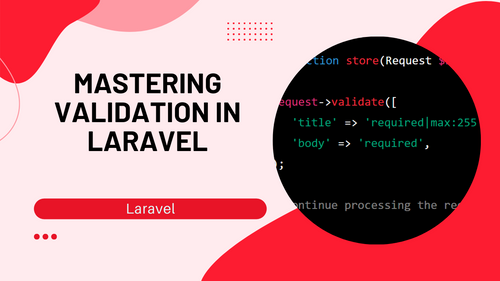In the realm of web application development with Laravel, data validation is a crucial aspect of ensuring data integrity and providing users with a seamless experience. Email validation rules, in particular, play a pivotal role in handling user input effectively. Whether you're a Laravel enthusiast or just starting, understanding how to create robust email validation rules is essential. In this comprehensive guide, we will explore the ins and outs of email validation rules in Laravel, providing you with expert insights, best practices, and code samples to master this vital aspect of web development.
The Significance of Email Validation Rules in Laravel
Before we delve into the nitty-gritty of email validation rules in Laravel, let's grasp why this process is of paramount importance.
1. Data Accuracy
Validating email addresses using rules ensures that the data your Laravel application collects is accurate and reliable. Inaccurate data can lead to communication errors and affect the overall functionality of your application.
2. Enhanced User Experience
Real-time email validation rules provide immediate feedback to users, enhancing their experience by preventing the submission of incorrect or invalid email addresses.
3. Security
Email validation rules are a security measure that helps prevent malicious or incorrect inputs that could potentially harm your application's functionality.
Email Validation Rules in Laravel: The Basics
Let's start with the basics of email validation rules in Laravel.
1. Using Built-in Validation Rules
Laravel provides a set of built-in validation rules, including an email validation rule, that you can use out of the box. Here's how to use it:
$validatedData = $request->validate([
'email' => 'required|email',
]);
In this example, we're using the email validation rule to ensure that the email field in the request contains a valid email address.
2. Custom Validation Rules
Sometimes, you may need to create custom email validation rules in Laravel to meet specific requirements. You can define custom rules using the Rule class. Here's an example of creating a custom email validation rule that checks for a specific domain:
use Illuminate\Validation\Rule;
$validatedData = $request->validate([
'email' => [
'required',
Rule::exists('users')->where(function ($query) {
$query->where('domain', 'example.com');
}),
],
]);
In this code, we're validating that the email field exists in the users table and has a specific domain.
Real-time Email Validation Rules
Implementing real-time email validation rules in Laravel can significantly enhance the user experience. Here's how to do it:
1. Use JavaScript and AJAX
<input type="email" id="email" name="email">
<span id="email-validation-message"></span>
<script>
const emailInput = document.getElementById('email');
const emailValidationMessage = document.getElementById('email-validation-message');
emailInput.addEventListener('input', () => {
const email = emailInput.value;
fetch('/validate-email', {
method: 'POST',
body: JSON.stringify({ email }),
headers: {
'Content-Type': 'application/json',
'X-CSRF-TOKEN': '{{ csrf_token() }}',
},
})
.then(response => response.json())
.then(data => {
if (data.valid) {
emailValidationMessage.textContent = 'Email is valid.';
} else {
emailValidationMessage.textContent = 'Invalid email address.';
}
});
});
</script>
In this example, we're using JavaScript and AJAX to send the email to the server for real-time validation and display a validation message.
Common Questions About Email Validation Rules in Laravel
1. Can I create custom email validation rules with Laravel?
Yes, you can create custom validation rules using Laravel's Rule class to meet specific requirements.
2. How can I ensure that email addresses are unique during registration?
You can use the unique validation rule to ensure email addresses are unique in the database.
3. What's the difference between real-time validation and form submission validation?
Real-time validation provides immediate feedback to users as they type, while form submission validation checks the email validity when the user submits a form.
4. How can I prevent spammy or disposable email addresses during registration?
You can use custom validation rules or third-party packages to check for disposable or spammy email domains.
5. Are there any security concerns with email validation rules in Laravel?
Email validation rules themselves do not pose security concerns, but it's essential to handle user data securely and follow best practices for data protection.
In conclusion, email validation rules are a fundamental aspect of Laravel web application development that enhances data integrity, user experience, and security. Whether you choose to use built-in validation rules, create custom rules, or implement real-time validation, mastering email validation rules in Laravel is essential for creating robust and user-friendly web applications. Elevate your Laravel development skills by implementing these techniques and providing users with a seamless and secure email input experience. Remember, user satisfaction and data accuracy are key to the success of your Laravel application.



